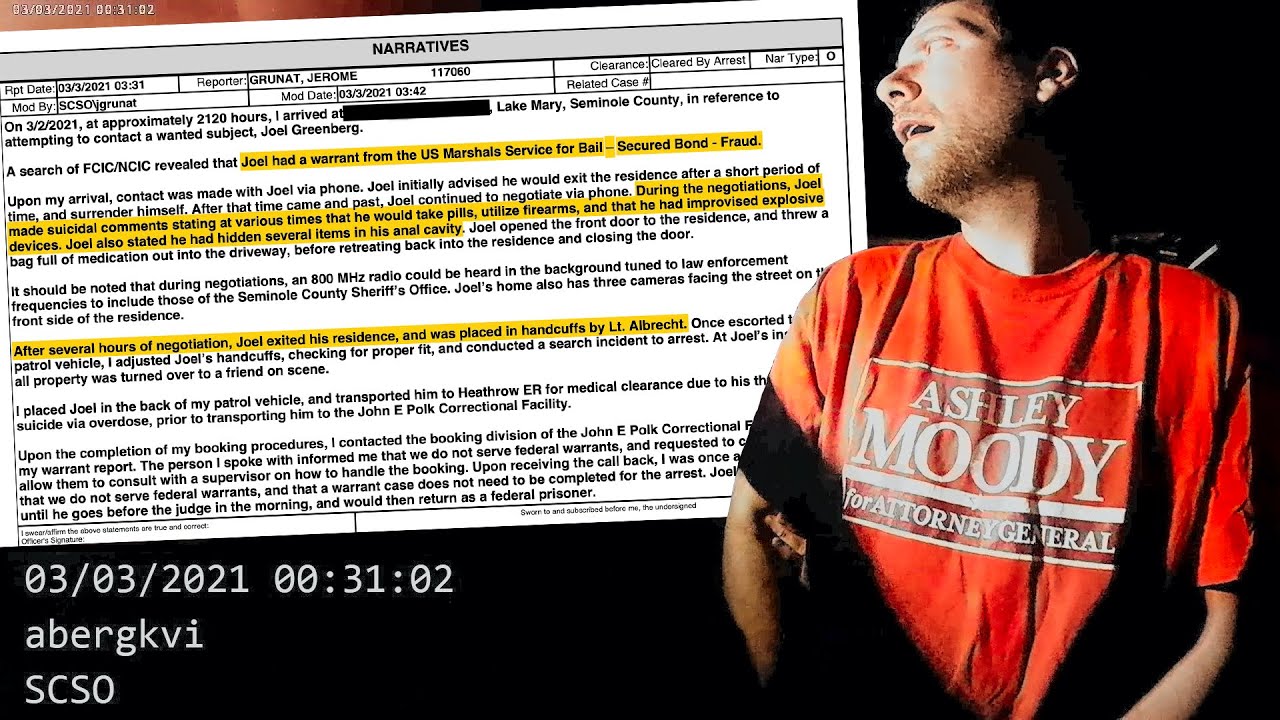Before we get into Joel Greenberg, there is the matter of the blurring in this video. Since I have brought up similar blurring in the past, I have an idea of how this goes: I explain why I believe the blurring is unlawful, and then a bunch of people try to explain to me why they think the agency is doing it (officer safety), ignoring the reality that even the most convincing explanation can’t change the law. If the police can’t legally do something, and they want to do that thing, there is a way to make it happen: through the legislature. Not by having the police ignore or violate the law.
Florida’s Public Records Law, often called the Sunshine Law, provides everyone with a right to access public records, and it defines that term expansively. When someone requests a copy of a public record, there is a presumption of access. The only acceptable reason for withholding a record (or information within a record) is that the record or information is exempt or confidential by law.
One of the Sunshine Law’s many exemptions is found in 119.071(4)(d)2.a., F.S.. Specifically, the exemption for “home addresses, telephone numbers, dates of birth, and photographs†of certain law enforcement officers. A minority of law enforcement agencies in Florida argue that a video is just a series of photographs in rapid succession, therefore the exemption for photographs applies to videos. In a particularly memorable email, the City of Ormond Beach once characterized body camera footage as “photographic video evidence†— so they could then redact the face of the police officer they had arrested, in the video that I had asked for… despite the fact that the officer had appeared in many Live PD episodes. They charged a couple hundred dollars for the privilege of seeing his blurred face.
I think those agencies are wrong.
First, the plain language of the law is unambiguous. The word “video†appears hundreds of times throughout the Florida Statutes, sometimes in the same sentence as the word “photograph.†The legislature obviously knew the word video. They didn’t use it. But they did define the term “body camera.†According to 119.071(2)(l)1.a, F.S., a body camera is “a portable electronic recording device that is worn on a law enforcement officer’s body and that records audio and video data in the course of the officer performing his or her official duties and responsibilities.†Catch that? “Video data.†Not photographs, series of photographs, or even photographic videos.
According to the Supreme Court “…the starting point for interpreting a statute is the language of the statute itself. Absent a clearly expressed legislative intention to the contrary, that language must ordinarily be regarded as conclusive.” The legislature could have exempted video. They didn’t.
There’s more. One of the canons of statutory construction — the rules for interpreting the rules — states that the express mention of a subject, object, or idea is the exclusion of other subjects, objects, or ideas. When a statute contains a list of specific contexts where it applies, the inference is that it doesn’t apply in other contexts. The legislature exempted photographs to the exclusion of video.
So, Joel Greenberg.
On the night of March 2, 2021, Seminole County Sheriff’s Deputy Jerome Grunat arrived at the home of disgraced Seminole County Tax Collector Joel Greenberg, in Lake Mary, Florida. It wasn’t a social visit.
Greenberg had a warrant from the United States Marshals Service for failure to abide by his conditions of release. After more than four hours of rather crazy negotiations, Joel finally walked out of his house at ~12:15 A.M.
In 2016, Greenberg was elected tax collector of Seminole County, after running a reportedly self-financed campaign that defeated 30-year incumbent Ray Valdes. Briefly a Republican rising star in Central Florida politics, Greenberg resigned from office on June 24, 2020, the day after he was arrested on a 33-count federal criminal indictment. (See pinned comment for details.) On May 17, 2021, Greenberg pleaded guilty to six counts as part of an 86-page plea deal that requires his cooperation with federal investigators in their probes of other high-profile individuals, most notably Republican congressman Matt Gaetz.
In exchange for his cooperation and guilty plea on six counts, Greenberg faces recommended sentence of 12 years. Greeberg’s actual sentence must be determined by a judge; his sentencing hearing is currently scheduled for March 22, 2022.
Real World Police was previously first to report that Greenberg is diagnosed with bipolar disorder.
~~~
/r/realworldpolice
@realworldpolice
~~~
00:00 Preview
03:28 Arrival
11:57 He wants to cut his ankle monitor off
19:45 I have Tannerite planted throughout my yard
31:40 He knows me, though he’s an a**hole
33:04 References being “dopesick”
36:56 Wearing an Ashley Moody shirt to jail
50:16 Joel! Get your a** out here now!
57:30 Joel emerges.
59:49 That only took four hours
** (Disclaimer: This video content is intended for educational and informational purposes only) **


The cops remarks after the “dopesick†comment about his undergarments probably looking like a used coffee filter made me lol. Been there, done that. 4 years, 4 months sober. I don’t wish dopesickness on my worst enemy.
I always enjoy seeing someone who thinks he’s so clever in handcuffs….
Coffee: Check.
Cigarettes: Check.
Real World Police notification: Check.
Real World Police: An important part of this complete breakfast.
RWP I appreciate your information in the description. I couldn't agree w you more.
"White male". Nope. Close but definitely not.
Why would the fire Marshall arrest him
Can't wait for the Matt Gaetz sequel
what qa great way to waake up
Not first 🤪
It’s going to be a great day since RWP uploaded a new video. 🙂
E